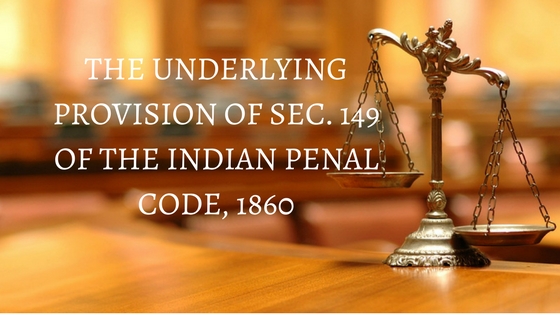Aapka Consultant Judgment Series- In this series, we are providing case analysis of Landmark Judgments of Hon’ble Supreme Court of India.
Rattiram & Ors. v. State of Madhya Pradesh, through Inspector of Police
[2013] 2 SCR 1003
JUDGES: K.S. Panicker Radhakrishnan and Dipak Misra
Date of Decision: 18-04-2013
FACTS:-
This appeal has been filed against the judgment of conviction and order of sentence passed by the Division Bench of High Court of Madhya Pradesh which confirmed the judgment and order of Ld. Addl. Session Judge except against Appellant No. 2 wherein the present appellant along with the Appellant No. 2 stood convicted under Sections 302 r/w sec. 149 of IPC and sentenced to imprisonment for life. The factual background was that the deceased Dhruv along with some other persons was returning home after attending a wrestling match and on the way back home, he was being assaulted by the accused person in result of which he felt unconscious and died. Appellant were charge-sheeted under Section 3(1)(x) of the Scheduled Castes and the Scheduled Tribes (Prevention of Atrocities) Act, 1989 but, eventually, charges were framed under Sections 147, 148 and 302 read with Section 149 IPC.
ISSUE:-
Two issues have come up before the Supreme Court for consideration: –
- Whether all the accused persons had participated in the assault or not?
- Whether judgment of conviction and order of sentence passed by Court below was proper?
JUDGMENT:-
The Hon’ble Supreme Court has concluded for the first issue that the Ld. Trial Judge has not averted to some of the facets of the case and directly came to the conclusion that all the accused persons were armed and had assaulted the deceased. The High Court also concurred with the reasoning given by the Trial court. The Court has stated that some of the witnesses had given contradictory statements regarding the presence of the accused at the crime scene which is highly improbable for the court to accept that all the accused persons were present there at the crime scene. Also the statements of the witnesses were contradictory in nature regarding the possession of the sticks by the accused persons. Two eye-witnesses have also turned hostile. Further, one of the witness denies the presence of one of the accused Babulal at the crime scene when he was being cross-examined and that creates a doubt in the mind of the court regarding the presence of all the accused during the crime. Due to the material contradictions about the presence of some of the accused persons at the crime scene, the court didn’t accept the view of both the courts below.
The Supreme Court, for the second issue, stated that the judgment of conviction and the order of sentence passed by both the courts below were improper to some extent as some of the witnesses contradict to their statement regarding the presence of some of the accused at the crime scene. It is not safe to hold that some of the accused-appellants were present at the crime scene, notwithstanding the statements of some of the witnesses regarding their absence, and record their conviction accordingly. The Court further observed that the mere presence of the accused at the crime scene does not make such person a member of an unlawful assembly unless some overt act has been proved against such person. The court gave the benefit of doubt to some of the accused persons regarding their presence.
HELD:-
The Court partially allowed the appeal of the accused-appellants and held that mere presence of a person in an assembly does not make the person a member of an unlawful assembly unless it is shown that he had done something or omitted to do something which would make him a member of an unlawful assembly and shall not be liable for conviction.
To Get Legal Opinion from Advocates/ Legal Experts, Please click here
To Get Legal Opinion from Retired Hon’ble Judges, Please click here












